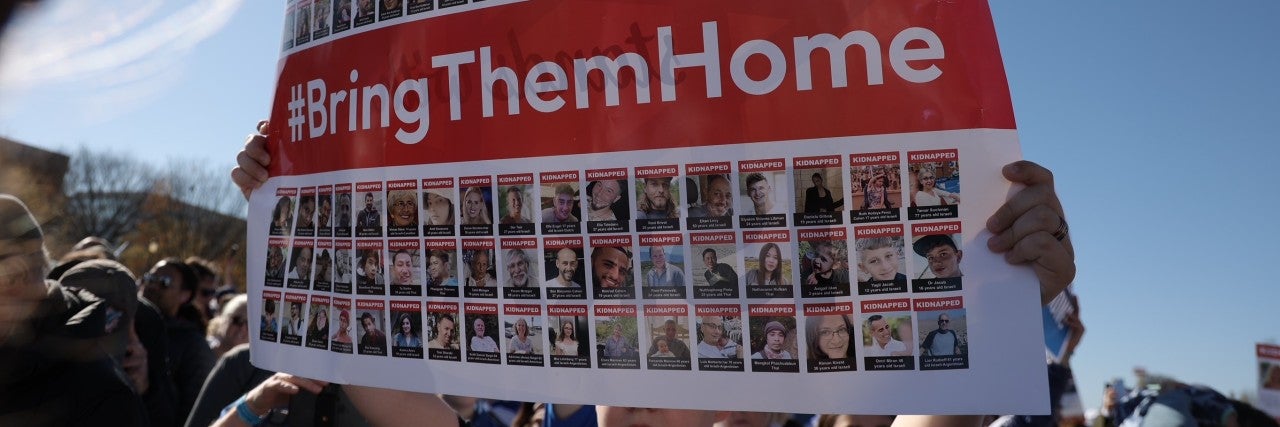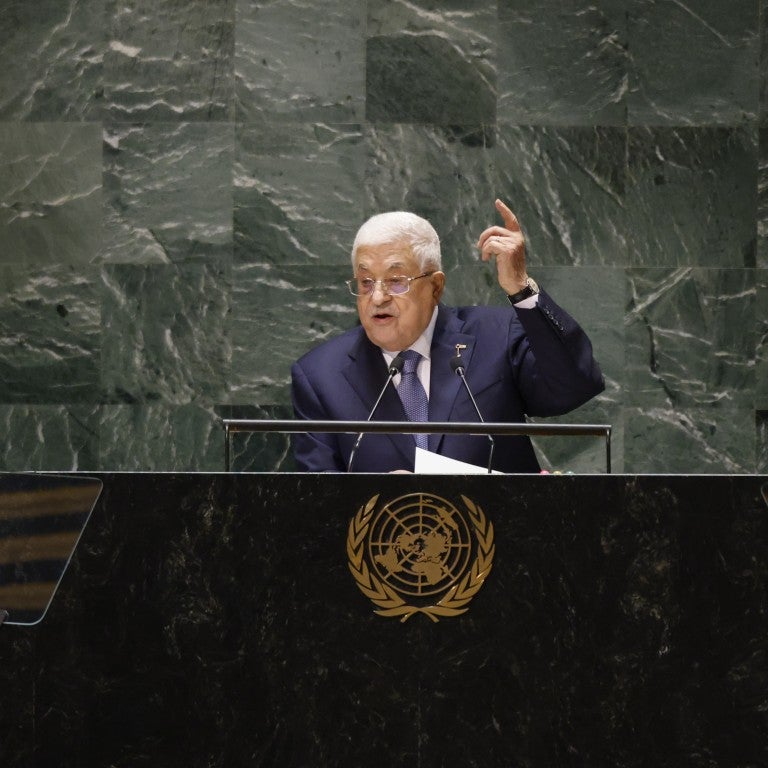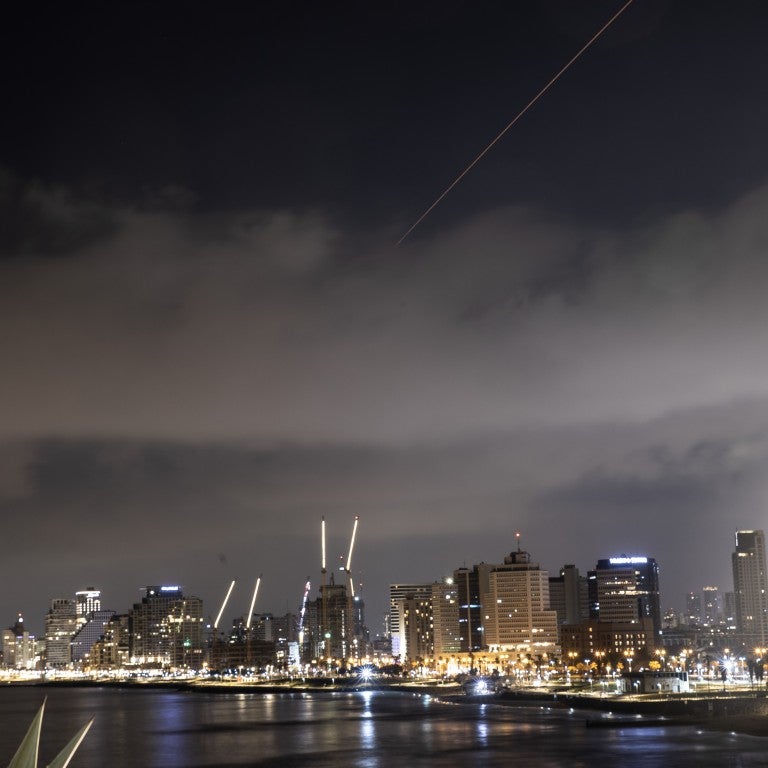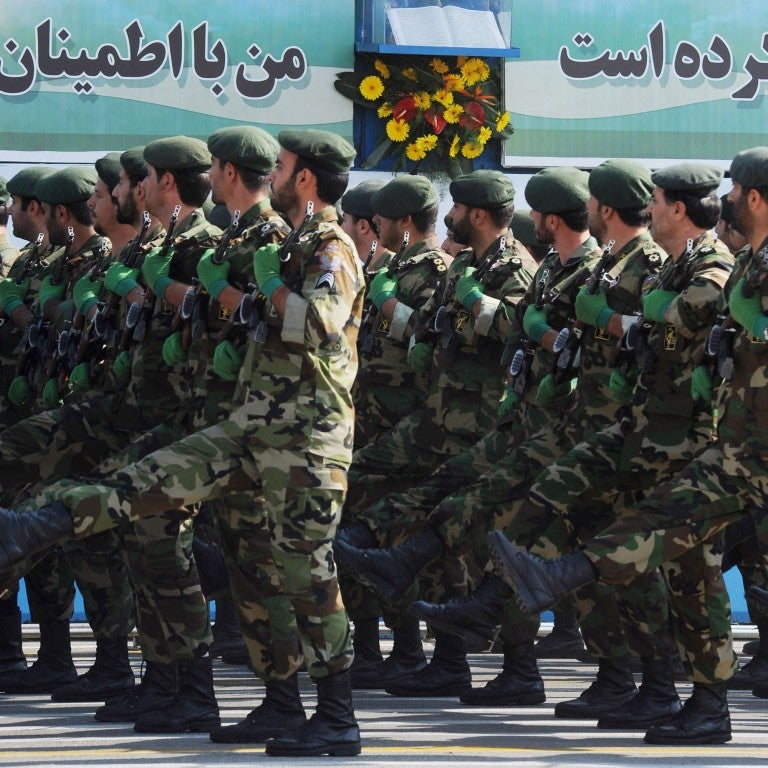November 29, 2023
From the frontlines of the Israel-Hamas War, Lt. Col. (res.) Avital Leibovich, director of AJC Jerusalem, joins us to discuss the current pause in fighting between Israel and the terror group Hamas, the release of hostages, the significance of international support for Israel, and the challenges the Jewish state faces in the West Bank. Leibovich also provides insights into the humanitarian conditions of the hostages and the broader implications of the conflict.
Take action to bring all hostages home now.
*The views and opinions expressed by guests do not necessarily reflect the views or position of AJC.
Episode Lineup:
- (0:40) Lt. Col. (res.) Avital Leibovich
Show Notes:
Listen – People of the Pod on the Israel-Hamas War:
- What Would You Do If Your Son Was Kidnapped by Hamas?
- The Good, the Bad, and the Death Threats: What It’s Like to Be a Jewish College Student Right Now
- Mai Gutman Was Supposed to Be at the Music Festival: IDF Lone Soldier Recounts Harrowing Week
- Responding to Hamas Terror: IsraAID CEO on How You Can Help Israelis Right Now
Watch – Lt. Col. (res.) Avital Leibovich’s War Diary
- How All Israelis are Affected by the Israel-Hamas War
- How October 7 "Changed the DNA" of Israelis Forever
- How Volunteers are Stepping up to Support the IDF
Learn:
- Debunking the False Equivalency Between Israeli Hostages and Palestinian Prisoners
- What is Known About Israeli Hostages Taken by Hamas
- How much do you know about Hamas? Try to ace our quiz and expose the truth about the terror group today.
Follow People of the Pod on your favorite podcast app, and learn more at AJC.org/PeopleofthePod
You can reach us at: peopleofthepod@ajc.org
If you’ve appreciated this episode, please be sure to tell your friends, and rate and review us on Apple Podcasts.
Transcript of Interview with Avital Leibovich:
Manya Brachear Pashman:
As the pause in fighting between Israel and Hamas terrorists nears its expiration on Thursday, Hamas continues to hold hostage 160 people. 80, including 61 women and children have been released during the pause. In exchange, Israel has freed 180 Palestinian prisoners. Lieutenant Colonel Avital Leibovich, Director of AJC Jerusalem joins us from Israel now for an update. Avital, welcome to People of the Pod and how are you?
Avital Leibovich:
Thank you for having me. I am doing well, considering the fact that we are in a war here in Israel. My biggest concern at this time is the well being of my family. My son is in the army, my daughter is on reserve duty. So that's my number one concern. And of course, the well being of Israel, the safety and security of Israel.
Manya Brachear Pashman:
So Avital, what does this pause mean? What is being accomplished during this time?
Avital Leibovich:
So the pause is something that Hamas pressured Israel. It pressured Israel because the military pressure was quite significant. The pause allows a few things to happen. Number one, we, Israel will receive hostages, and in return, Israel will free from prison, women and youth that were involved in different planning of terror attacks or executed themselves terror attacks. And that's one thing. The second thing I would say, is time for Hamas to regroup. That's for their benefit. This pause allows them to regroup, rearm, reposition themselves. The third thing and I'm going back to Israel also allows Israeli army to better prepare to rearm to place itself in the right positioning and then be ready for the next stage, which is resumption of the fighting.
Manya Brachear Pashman:
And do you expect that fighting to resume right away? Or do you think that Israel would like to extend the pause as long as possible in order to get as many hostages back as possible?
Avital Leibovich:
Yesterday, there were meetings between, actually was a very interesting meeting in Qatar. In the meeting, we had the head of the Egyptian intelligence, the head of the Israeli Mossad, and the Qatari representative, and the American head of the CIA, the American CIA. And in this meeting, the discussion evolved on a few more days of pause, and in return, Hamas will release a few more hostages.
So right now Israel has said that it agrees to a few more days of a pause. But we're only talking about a few more days. The ultimate goal of this war is to eliminate Hamas government in Gaza. And in order to change that government, in order to bring some sort of a new future to this region, to Israel, to Gaza, to the Palestinians living in Gaza, this takes time.
So the fighting I assume will take a long time. It's going to be a long time because Gaza has been built underground and above the ground in such a way that requires inch by inch, very careful work a lot of the time other facilities are booby trapped. There is a huge array of tunnels underground, which are very long. With junctions. Some of the tunnels can even have cars inside. So this has to be a very, very careful job. We have a lot of soldiers inside Gaza right now. And so this pause I would say is temporary.
Manya Brachear Pashman:
What are we learning from the hostages who are being released?
Avital Leibovich:
That's the most heartbreaking issue. We're learning a few things. The first thing is they had to speak very, very quietly among themselves. Of course, I'm referring to those who had other hostages with them. But those who had other hostages with them had to whisper. And how do we know this because some of the kids are still whispering today, some of the kids that have been held as hostages and just returned from captivity, they're still whispering. Another thing we know is that they had very little food, very little quantities of food, which also brings a lot of worries here in Israel, because there are many elderly people held. There's still a baby inside the toddlers and a few other children. And so the nutrition issue obviously is quite critical.
The third thing we learned is that some of them were held in complete seclusion. One of the children that returned two days ago is a 12 year old boy, by the name of Eitan Yahalomi. His father was murdered, his mother is still alive. And he actually was in a room by himself for at least two weeks. And imagine for a 12 year old to be in this kind of hostile environment, on his own without anybody to communicate, underground, most of the time, that's quite scary.
We also know that they had very poor hygiene conditions, no running water, very, very minimal toilet facilities. We also know they never received any medical care and attention, no medicine, no doctors, nothing of that sort. And the last thing we know is that most of the time they were held underground, in an underground facility, different sizes of rooms. And all of these things are just a small indication of the cruelty of this terror organization called Hamas.
Manya Brachear Pashman:
Congress is debating whether to send aid to Israel to support Israel in the war. How important is it at this point?
Avital Leibovich:
I think it's very important. First of all, I do want to say that the support that Israel received from the US until now, it's unbelievable. The fact that there are, on the military side the fact that there are our aircraft carriers here in the region, and planes filled with different kinds of ammunition. That sends a very strong message of both deterrence and strength to the enemies in the region. And second, on the political, more strategic level. The voting, the vetoing of the different proposals on the Security Council in the UN, the multiple visits starting from President Biden to Secretary of State Blinken, which he’s supposed to arrive here tomorrow. And also appointing a special envoy to this specific situation that we have here in the region.
So all of these things speak volumes. So yes, I think it's very significant to Israel, and also the future decisions will be significant. Look, being at war for such a long time and 53 days have passed already has serious precautions on different issues. Economy is one of them. Obviously, tourism has stopped, small businesses have been affected and many other sectors as well. So aid would be very, very significant to Israel.
Manya Brachear Pashman:
I'm also curious about the security situation in the West Bank. We were so focused on terrorism coming from the West Bank before this happened. What is the situation there now, especially as hostages are being released?
Avital Leibovich:
It's a good question, because from where I'm sitting, the West Bank at this point of time is another front that Israel has to deal with at this specific moment. We have a serious challenge with the fact that the Palestinian Authority does not really have governance in many areas in the West Bank. And as a result of that, there are different kinds of terror groups, Hamas is one of them. But it's not the only one, trying to recruit Palestinians to commit different terror attacks. The second side of it is a lot of incitement, which is really flooding the social media platforms, and also has an effect on the mood on the streets on the mood of young people and others as well. So the IDF, the Israeli Defense Forces, actually almost on a daily basis, needs to enter certain areas where there is no prisons, unfortunately, have any Palestinian policemen, and actually arrest those terrorists on the ground. And I think in the last 50 days or so the IDF has arrested more than 1000 people that have been suspicious and with some kind of planning or plotting terror attacks against Israelis. And this does not seem to quiet down I have to say so I am concerned of this front.
At this point of time Hamas is though, by the way, investing a lot of time and effort because Hamas is interest is of course, to create lack of stability here in Israel. So part of that is the instability is trying to influence what's going on in the West Bank and trying to get people out to the streets, either protesting against idea for committing some sort of terror acts against Israelis so that's really an issue of concern for us.
Manya Brachear Pashman:
We talked about the importance of American aid, are there other countries that are showing significant support that have been really vital in this war?
Avital Leibovich:
I think that we've seen some very important gestures of support by European leaders from the Czech Republic, from Bulgaria, from, from the UK, from France, from Japan, from other countries. But I think the number one country in Europe that really stood up and is still standing up supporting Israel very, very strongly, is maybe Germany. And yesterday, the President of Germany visited Israel and visited one of the kibbutzes, a kibbutz called Be’eri. And a lot of the houses there were burned and dozens of people were murdered and others were kidnapped. And he was so touched and moved. And he said that the government of Germany intends to donate 7 million euros just for the rebuilding and renovating of this community.
But there are other countries as well, and I think Israel has been well supported by the international community. However, the challenge still lays ahead, because we are not at the end of this war. And in order to eliminate Hamas, we need more time. And as this time progresses, there will be a lot more pictures which are not pleasant because pictures from wars are not pleasant pictures. And this may have an impact on different kinds of world leaders. So we have to continue and explain and gain that legitimization so that Israel could complete its goal and continue to defend itself.
Manya Brachear Pashman:
I know in conversations with AJC's, Berlin's director Remko Leemhuis, he brought delegations of German officials to Israel. And that has made quite a difference, I think, to see it firsthand. Have there been other delegations from other countries?
Avital Leibovich:
So we have hosted here in Israel four delegations with very short notice. I have a great staff in the office, and they were able to create an itinerary, which I think is very experiential on one hand, but on the other hand, is also quite touching. Because how many people in such leadership positions really have the opportunity to really be on the ground and see the situation as it is. So we had here three parliamentary delegations from European countries, East and Western Europe. And we also had here the head of the, the chair of the Foreign Affairs security committee of the German parliament. And I met those three parliamentary delegations, and I briefed them.
And I have to say that with all the information that is out there today in 2023, via the internet and platforms and social media, still there is not a full understanding of the situation. So taking these participants on the ground, showing them those areas, those communities that have been affected, and taking them to a base that has been turned into a morgue. Where, even today, more than 80 bodies and body parts still remain unidentified because of the terrible condition that they came with. And I explained to them the extent of the atrocities. You can only really get it when you're on the ground.
Manya Brachear Pashman:
Avital, once this pause expires, and I know it's unclear when that will be, but you've made it clear that it's inevitable – what comes next?
Avital Leibovich:
I think we are heading into a very difficult time ahead. Because once we finish the hostage exchange kind of agreements, then Israel will have to return to the actual fighting part. And Hamas, which is a very bitter psychological warfare enemy will continue and try to stop this fighting in different psychological ways. Israeli leadership will have to make here tough decisions, whether the country agrees, for example, just I'll give you just one idea of such a dilemma.
Let's say Hamas tomorrow morning, or in three days time says, complete and finish the fighting altogether. Stop for the next five years, hold your fire for the next five fears, and in return, we will return all the hostages. Then what, then what do you do as a country? What kind of decision will the government take? Will it still continue with the fighting to eliminate Hamas? Or will it say okay, the life of the hostages are more important and therefore, we are canceling the original goal and stopping the fighting. I don't think that will happen.
But those kinds of dilemmas, I think will escort Israeli leaders in the next couple of days. I think they will be tough, very tough questions ahead that Israel will need to deal with. Another issue that we haven't discussed, is the northern arena. Hamas is a tough enemy. is a cruel enemy. It possesses something like 20,000 rockets, which they used more or less half, maybe a bit more. Because Hezbollah is a totally different ballgame in terms of capabilities in terms of military capabilities in terms of ammunition, precise ammunition and so on. And what will be the policy visa vie Hezbollah. And this is also a question Israel will need to ask itself and I'm sure that the next week or two will have an indication where this country is heading. There's one thing that it's clear to all of us here in Israel, that we cannot go back to the same situation that existed here on October 6–53 days ago. That situation must be changed.
Manya Brachear Pashman:
Avital, thank you so much for joining us and giving us an update.
Avital Leibovich:
Thank you for the opportunity.





